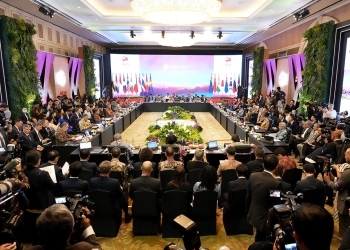Asia
The 13th East Asia Summit (EAS) Foreign Ministers’ Meeting



On July 14, commencing at 10:00 a.m. local time (12:00 pm, JST) for about 120 minutes, the 13th East Asia Summit (EAS) Foreign Ministers’ Meeting (Chair: H.E. Ms. Retno Marsudi, Minister for Foreign Affairs, Indonesia) was held in Jakarta, Indonesia. Mr. HAYASHI Yoshimasa, Minister for Foreign Affairs of Japan, attended the meeting. The overview of the meeting is as follows.
1. EAS Cooperation
Minister Hayashi expressed support for ASEAN centrality and unity as well as ASEAN Outlook on the Indo-Pacific (AOIP), and stated that Japan had implemented many concrete cooperation projects in line with the four priority areas of the AOIP.
2. Regional and international issues
Minister Hayashi reaffirmed the importance of upholding the free and open international order based on the rule of law, and stated that it was also confirmed at the G7 Hiroshima Summit that the G7 would strengthen cooperation in the Indo-Pacific region. The overview of his remarks are as follows.
- Japan strongly condemns Russia’s aggression against Ukraine. Russia’s nuclear threats, let alone its use of nuclear weapons, is absolutely unacceptable. Japan urges Russia to immediately, completely and unconditionally withdraw all of its military forces from the territory of Ukraine.
(Other participating countries expressed serious concerns over the situation in Ukraine, condemned Russia’s aggression against Ukraine.) - Unilateral attempts to change the status quo by force should never be tolerated anywhere in the world. Japan strongly opposes to China’s continuing and intensifying activities that infringe on Japan’s sovereignty in the East China Sea. Militarization and coercive activities have also been continuing in the South China Sea. The peace and stability across the Taiwan Strait is also important for the region and the international community.
(Other participating counties expressed concerns over the situation in the South China Sea, mentioned the importance of the freedom of navigation and overflight, of the peaceful resolution of disputes in accordance with international law, and of the peace and stability across the Taiwan Strait, and expressed concerns over the increasing tensions.) - As shared issues in the region, Japan strongly opposes economic coercion. Fundamental human rights, freedoms and democracy must also be protected and promoted in the region. In addition, there are various challenges related to international public goods, including climate, environment, global health, and cyber.
- Japan will make efforts to build a “constructive and stable relationship,” with China. To this end, we will maintain and assert our position and strongly request China’s action as a responsible member of the international community. At the same time, we will continue to have dialogues with China including on issues of concern and to cooperate on matters of common interest including global issues.
- Japan strongly condemns the launch of an ICBM-class ballistic missile by North Korea on July 12 as it threatens the peace and security of the international community. Japan welcomes the ASEAN Foreign Ministers’ Joint Statement issued yesterday which expressed grave concern over this launch by North Korea. It is essential for the international community to be united and to fully implement the relevant UN Security Council resolutions, in order to achieve the complete, verifiable, and irreversible dismantlement (CVID). Japan asks for continued understanding and cooperation toward the immediate resolution of the abductions issue.
(Other participating countries spoke on concerns over North Korea’s provocative behaviors, and on the importance of the denuclearization of the Korean Peninsula and the full implementation of the relevant UNSCRs.) - Japan is seriously concerned about Myanmar, where the violence has not been stopped and the situation continues to deteriorate. Japan will continue to actively provide humanitarian assistance, and to give maximum support to ASEAN's efforts to implement the “Five-Point Consensus.”
(Other participating counties also expressed serious concerns over the situation in Myanmar and emphasized the importance of early implementation of “the Five-Point Consensus.”)
3. ALPS Treated Water
Minister Hayashi clearly explained Japan's position, referring to the assessment in the IAEA Comprehensive Report that the discharge of ALPS treated water into the sea is consistent with international safety standards, and will have a negligible impact on people and the environment. China made its own claim that is not based on scientific evidence.
(Among other countries, there was a statement that welcomed the transparency of the IAEA Comprehensive Report.)
4. Closing Remarks
In the end, Minister Hayashi stated that Japan will promote concrete cooperation in a realistic and practical manner in the Indo-Pacific way to address common regional challenges and concerns.
[Attachment]
Chairman’s Statement (PDF)

